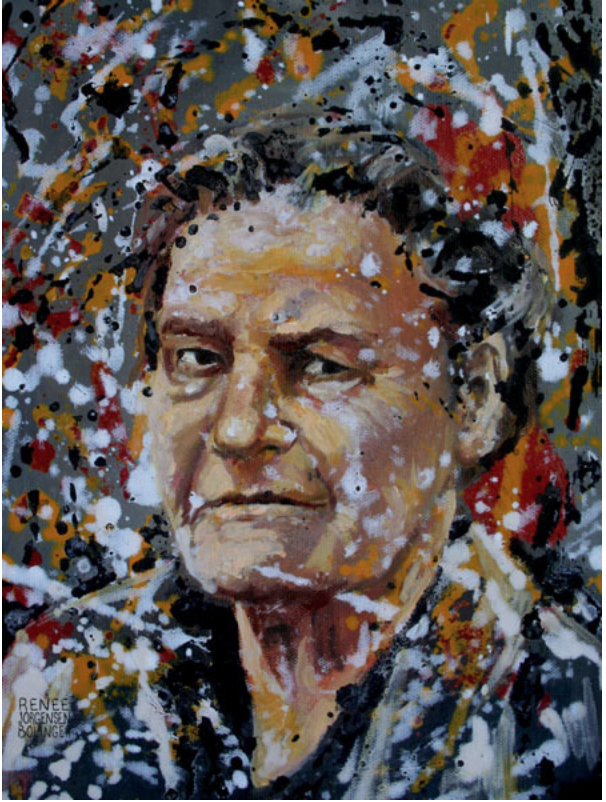G.E.M. Anscombe by RENÉE JORGENSEN BOLINGER
Course syllabus available here.
PHIL 534: Virtue and Moral Worth
Aristotle distinguished between actions done from virtue and actions done merely in accordance with virtue. For Aristotle, the very best kinds of actions -- those from virtue -- require a kind of moral understanding that Aristotle calls ‘practical wisdom’. Kant also offered a view about the morally best actions. For Kant, the best actions have ‘sittlichen Werte’, as it is called in the Groundwork of the Metaphysics of Morals, which has been translated as ‘moral worth’. According to Kant, moral worth is the distinctive kind of value possessed by the holy will, the will whose source of motivation is the faculty of reason itself.
Both conceptions have earned their fair share of criticism. Possessing Aristotelian virtue requires possessing certain character traits, but research in social psychology casts doubt on the existence of such traits. And the ideal Kantian agent, whose actions have moral worth, has been accused of ‘moral fetishism', of being alienated from the ends at which morality properly aims like happiness, justice, and equality. This class is concerned with what Aristotle's conception of virtue and Kant's conception of moral worth can tell us about the most morally valuable kinds of actions. Both conceptions imply that actions possess an important kind of value when they meet both outer standards of moral rightness and inner standard of good moral motivation. But what is the nature of that value? And how, exactly, do our actions come to possess it? We'll begin by setting up a foundation in both primary material from Kant, Hume, and Aristotle and in secondary scholarship on those philosophers as it relates to questions of virtue and moral worth. We'll then move to the contemporary debate over moral worth between, inter alia, Nomy Arpaly, Julia Markovits and Paulina Sliwa, which will push us to reflect on what it means to act for a reason, the question with which the class concludes.
Presentations:
Each student enrolled in the course will both present and comment on another’s presentation once, during the semester. The first half hour of each class will be dedicated to these presentations. Their purpose is to help you develop the kind of professional skill you will need for the kind of presentations to will deliver at large conferences like the American Philosophical Association and the Canadian Philosophical Association. So, the presentation will be 20 minutes and no more, and the response will be 10 minutes and no more, and there will be 20 minutes discussion.
At least seven days before your presentation you must email your presentation to your commentator and send an abstract to me (nathanrhoward@gmail.com), which I will forward to the rest of the class. You may — and indeed, are encouraged — to use your presentation to inform your final paper for the course. The feedback you receive from me and your peers will help you produce the final version.
Although 20 minutes may seem intimidating, it is very likely that you will end up with more material than can be presented in 20 minutes. Nevertheless, the presentations are on a strict schedule and you may speak no longer than 20 minutes (10 minutes for comments). Think about what material you want to present, and what material you want to hold back for use during the Q&A. It is sometimes a more forceful technique to made some criticism for which you have a strong response salient during the presentation, so that you are asked about the criticism during the Q&A. You can then tailor the strong response to exactly the concerns voiced in the question.
Grades:
I grade using this excellent rubric, by Micah Lewin. Roughly,
Grades in the C range represent performance that meets expectations;
Grades in the B range represent performance that is substantially better than the expectations;
Grades in the A range represent work that is excellent.
Attendance and Absences:
Attendance is expected and will be taken each class. You are allowed to miss 2 classes during the semester without penalty. Any further absences will result in point and/or grade deductions from the overall grade.
Absent students are responsible for all missed work, regardless of the reason for absence. It is also the absentee’s responsibility to get all missing notes or materials.
Academic Honesty Policy:
X University values academic integrity. Therefore, all students must understand the meaning and consequences of cheating, plagiarism and other academic offences under The Code of Student Conduct and Disciplinary Procedures (see [appropriate website] for more information). The Code provides guidance about how to properly cite, reference, and attribute the intellectual property of others. Any attempt to deceive a faculty member or to help another student to do so will be considered a violation of this standard..
Electronic Devices Policy:
No laptops, cellphones, tablets, etc. are to be used during class. Those with extenuating circumstances should notify me via email (nathanrhoward@gmail.com) to receive a special dispensation.
Late assignments policy:
All students have an automatic seven-day extension on all assignments -- no email requests are necessary to take advantage of this policy. No marks will be deducted during this period. No work will be accepted after this seven-day period without appropriate medical documentation or equally certain evidence of comparably excusing circumstances.
